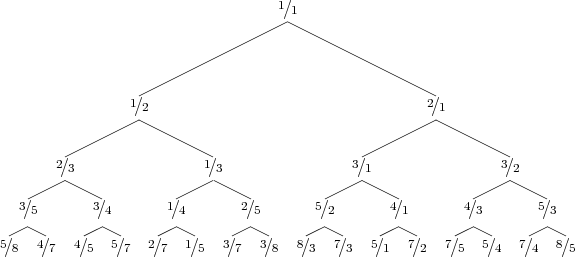| Submit | All submissions | Best solutions | Back to list |
NWERC11B - Bird tree |
Bird tree
The Bird tree1 is an infinite binary tree, whose first 5 levels look as follows:

It can be defined as follows:

This is a co-recursive definition in which both occurrences of bird refer to the full (infinite) tree. The expression bird + 1 means that 1 is added to every fraction in the tree, and 1∕bird means that every fraction in the tree is inverted (so a∕b becomes b∕a).
Surprisingly, the tree contains every positive rational number exactly once, so every reduced fraction is at a unique place in the tree. Hence, we can also describe a rational number by giving directions (L for left subtree, R for right subtree) in the Bird tree. For example, 2∕5 is represented by LRR. Given a reduced fraction, return a string consisting of L’s and R’s: the directions to locate this fraction from the top of the tree.
Input
On the first line a positive integer: the number of test cases, at most 100. After that per test case:
- one line with two integers a and b (1 ≤ a,b ≤ 109), separated by a ’/’. These represent the numerator and denominator of a reduced fraction. The integers a and b are not both equal to 1, and they satisfy gcd(a,b) = 1.
For every test case the length of the string with directions will be at most 10 000.
Output
Per test case:
- one line with the string representation of the location of this fraction in the Bird tree.
Sample in- and output
|
Input |
Output |
3 1/2 2/5 7/3 |
L LRR RLLR |
1Hinze, R. (2009). The Bird tree. J. Funct. Program., 19:491–508.
| Added by: | Jeroen Bransen |
| Date: | 2011-11-02 |
| Time limit: | 1s |
| Source limit: | 50000B |
| Memory limit: | 1536MB |
| Cluster: | Cube (Intel G860) |
| Languages: | All except: ASM64 |
| Resource: | NWERC 2011 Jury |
hide comments
|
|||||
|
2015-12-05 16:19:27
Is there any special case needed to check? I got correct results for all numbers in the given diagram, but wrong answer when I submitted it. |
|||||
|
2015-07-24 10:05:05 miodziu
hint: https://en.wikipedia.org/wiki/Stern%E2%80%93Brocot_tree |
|||||
|
2015-05-25 09:45:48 soursugar
the figure doesn't seem to follow the recursive defn. e.g.: 1/((1/3)+1) is 3/4. follow the figure or the recursive defn? |
|||||
|
2014-01-11 18:58:30 Bhavik
very good problem |
|||||
|
2013-06-07 05:43:23 Agnisnato Datta
nice prob...try to concentrate on fig |
|||||
|
2012-11-20 02:11:43 Paul Draper
Nice one, Jeroen! Thanks for the visual. |
|||||
|
2012-07-23 03:46:55 rohitjv
yeah...took a lot of time to understand |
|||||
|
2012-02-25 09:56:17 Ajey Golsangi
This one took a lot of time. |
|||||
|
2012-01-12 18:56:45 Santiago Palacio
Agree with bond, understanding it was the most difficult thing. |
|||||
|
2011-12-31 11:44:57 Devil D
At Last got it |
|||||


 RSS
RSS